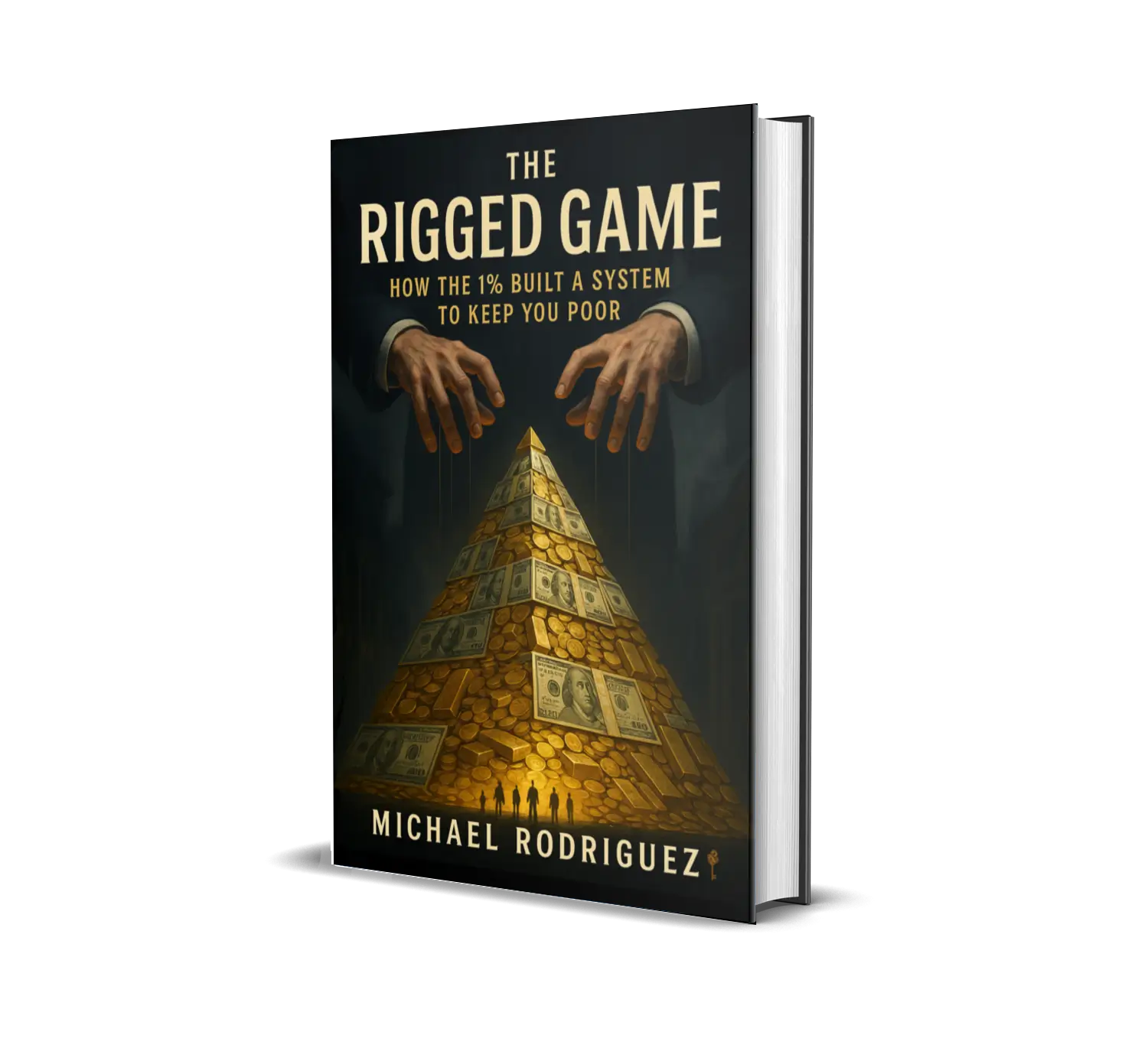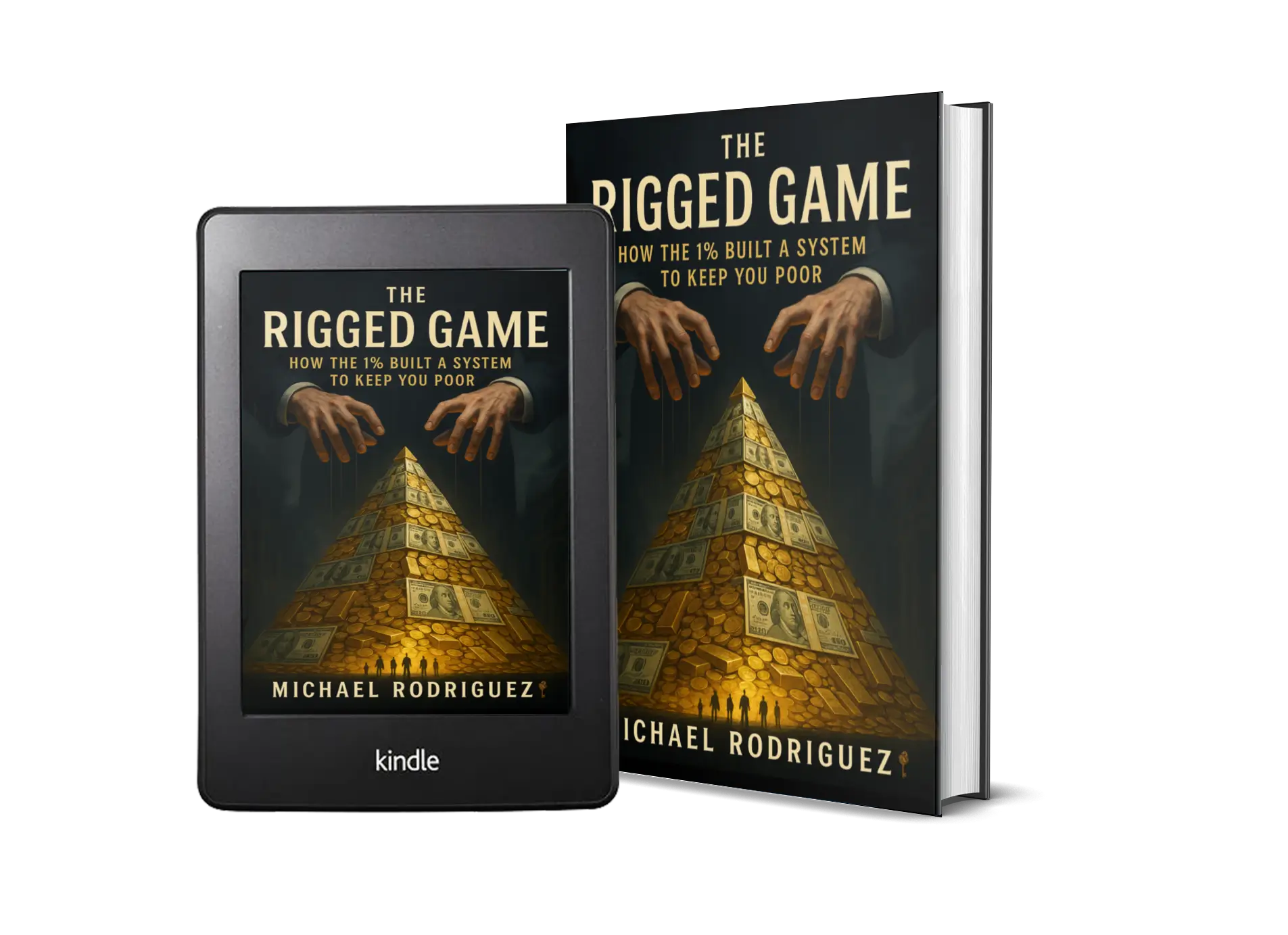The Rigged Game FAQ: How the 1% Built a System to Keep You Poor
Published August 29, 2025 | Updated August 29, 2025

Picture this scenario: You wake up tomorrow morning to discover that while you were sleeping, ten men—just ten human beings—had somehow acquired more wealth than 3.8 billion of their fellow humans combined. Half the planet's entire population. Every construction worker in Bangladesh, every teacher in Brazil, every farmer in Nigeria—all of them together possess less than these ten individuals.
You'd think this was dystopian fiction. But it's happening right now, today, while you're reading these words. Welcome to the most perfectly rigged game in human history.
The questions below represent the most frequently searched inquiries about wealth concentration, economic inequality, and financial system manipulation that readers research after discovering the explosive revelations in The Rigged Game. These answers are based on extensive investigative research, including interviews with former investment bankers, leaked documents, and analysis of financial mechanisms that determined humanity's economic future.
Q1: What is The Rigged Game about and why should I read it?
The Hidden Truth Behind Extreme Inequality: This isn't just another economics book complaining about rich people—it's an investigative exposé revealing the specific techniques used to systematically extract wealth from your economic activities.
The book exposes how ten individuals have accumulated more wealth than 3.8 billion people combined through systematic wealth concentration techniques that trace back to 1602 Amsterdam. Through eighteen months of following money trails through leaked documents, court records, and offshore databases, The Rigged Game reveals the hidden mechanisms that make extreme inequality inevitable under the current system.
This investigation interviewed former investment bankers who built the modern financial system, ex-government officials who watched it take over their countries, and reformed money launderers who helped hide trillions from public view. The result isn't theoretical analysis—it's concrete documentation of how wealth concentration actually operates.
You should read it because understanding how the game is rigged is the first step toward protecting yourself from it and potentially changing it. The book provides both the historical context for current inequality and practical strategies for navigating a system designed to extract value from your labor and savings.
Q2: How did the Dutch create the first wealth concentration machine?
The 1602 Innovation That Changed Everything: In Amsterdam four centuries ago, a small group of merchants accidentally invented the financial instruments that would eventually control the global economy.
The Dutch East India Company (VOC), established in 1602, created the first systematic wealth concentration machine by combining joint-stock corporations, public stock markets, government debt instruments, derivatives trading, and boom-bust cycles. These weren't separate innovations—they formed an integrated system designed to concentrate capital while minimizing risk for investors and maximizing returns without regard for social consequences.
The Rigged Game documents how the VOC demonstrated that private companies could accumulate resources that rivaled nation-states, operate across national boundaries without accountability to any government, and use economic power to influence political decisions in multiple countries simultaneously.
Every major feature of today's global financial system traces back to innovations first implemented in Amsterdam: corporate structure, stock markets, government debt markets, international banking, derivatives markets, and the pattern of speculative bubbles followed by financial crises. The Dutch established the intellectual framework that still justifies extreme wealth concentration today.
Q3: What is the $2 trillion secret they don't want you to know?
The System is Working Exactly as Designed: The biggest secret isn't that capitalism is broken—it's that capitalism is working perfectly to achieve its actual purpose: systematically transferring wealth upward while making this transfer appear natural and inevitable.
Every crisis, every market crash, every "too big to fail" bailout isn't a bug in the system—it's a feature. The Rigged Game exposes how financial crises function as wealth transfer mechanisms, allowing those who control capital to acquire assets at crash prices while socializing their losses through government bailouts funded by taxpayers.
The $2 trillion figure represents conservative estimates of wealth that moves upward annually through financial engineering techniques invisible to most people: derivatives manipulation, offshore tax avoidance, regulatory capture, debt compound interest structures, and asset price inflation that benefits owners while impoverishing renters and workers.
This system operates through legal structures, financial mechanisms, and political relationships that exist because enough people continue participating voluntarily. But voluntary participation depends on believing the system serves your interests, or that no alternatives exist—both beliefs this book systematically destroys.
Q4: How does wealth concentration affect my daily life?
Every Dollar in Their Accounts Represents Your Lost Opportunity: Extreme wealth concentration isn't just about rich people getting richer—it's about systematic resource transfer away from schools, infrastructure, healthcare, and community investment that directly impacts your quality of life.
When billionaires park $32 trillion in offshore tax havens, that's $32 trillion not funding public transit, not repairing bridges, not supporting teachers, not developing renewable energy infrastructure. The Rigged Game demonstrates how wealth concentration creates artificial scarcity in public goods while creating artificial abundance in luxury markets.
The investigation reveals how financial engineering keeps wages stagnant while asset prices soar, making housing, education, and healthcare increasingly unaffordable. This isn't coincidence—it's the predictable result of prioritizing capital returns over wage growth, speculation over production, and private accumulation over public investment.
Understanding these connections helps explain why you're working harder for less purchasing power despite unprecedented technological productivity. The gains from technological progress are being captured by those who control capital rather than shared with those who create value through labor.
Q5: Are there viable alternatives to this rigged system?
Proven Models Already Working Worldwide: The oligarchy's greatest fear isn't revolution—it's that you'll discover successful alternatives that prove another way is possible.
The Rigged Game documents cooperative models and democratic ownership structures already outperforming extractive capitalism in various sectors worldwide. These include worker cooperatives that share profits democratically, public banking systems that serve community needs rather than private accumulation, and participatory budgeting processes that prioritize social welfare over elite preferences.
The book examines successful examples like the Mondragón Corporation in Spain, Kerala's development model in India, Nordic social democratic systems, and community development financial institutions that demonstrate how economic systems can prioritize human needs over pure profit extraction.
These alternatives aren't utopian theories—they're practical demonstrations that markets can serve social purposes when structured appropriately, that democratic participation can guide economic development effectively, and that extreme inequality isn't inevitable if societies choose different priorities and structures.
Q6: Is the current wealth concentration system sustainable?
Mathematical Impossibility of Infinite Growth: The current system faces fundamental contradictions that make its long-term survival impossible without radical changes or collapse.
The Rigged Game analyzes how wealth concentration requires infinite growth on a finite planet, creates debt that grows faster than the economy's ability to service it, and concentrates wealth at rates that eventually undermine the political stability necessary for capitalism to function.
When wealth concentrates beyond certain thresholds, it creates political instability because democratic institutions become subordinate to financial power. The investigation documents how extreme inequality eventually makes societies ungovernable through traditional democratic processes, as political decisions become increasingly influenced by wealthy elites rather than popular will.
Current concentration rates are approaching historical levels that have previously triggered major social upheavals. The book examines how previous wealth concentration peaks led to wars, revolutions, or major structural reforms, suggesting that similar disruptions may be inevitable without conscious intervention.
Q7: What can I do with this knowledge to protect myself?
Personal Strategy and Systemic Change: Understanding wealth concentration techniques provides both defensive and offensive strategies for navigating an extractive system.
Defensively, The Rigged Game helps you recognize and avoid financial traps designed to extract wealth from ordinary people: predatory lending, fee-heavy investment products, tax structures that favor capital over labor, and debt instruments that transfer wealth upward through compound interest.
Offensively, understanding the system allows you to potentially benefit from techniques typically reserved for elites while working to change the system fundamentally. This includes joining or creating cooperative enterprises, supporting alternative financial institutions, and participating in political movements that challenge wealth concentration.
The book emphasizes that individual solutions are insufficient without systemic change, but individual understanding is essential for effective collective action. Knowledge without action is entertainment, but informed action can contribute to larger movements challenging the rigged game itself.
---Available Now
Libraries: OverDrive, Hoopla, BorrowBox
📘 ISBN: 979-8231144044 (Hardcover) | 979-8231940332 (eBook)
Published: August 2025 | Resource Economics Press
---About this Investigation: This FAQ draws from over 200 hours of interviews with former investment bankers, government officials, and reformed money launderers, combined with analysis of leaked documents, court records, and offshore financial databases.
The investigation traces how wealth concentration decisions are really made and reveals the hidden power structures that determine humanity's economic future. As readers discover throughout The Rigged Game, understanding these dynamics is essential for ensuring economic systems serve public rather than private interests.
